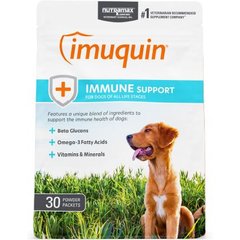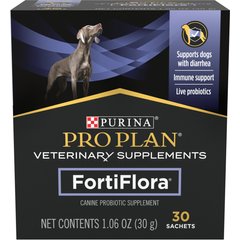What To Know About Possible Vaccine Reactions in Dogs
What Is a Vaccine Reaction in a Dog?
The American Animal Hospital Association (AAHA) recommends that all dogs, regardless of lifestyle, be vaccinated with core vaccines unless there’s a medical reason not to vaccinate.
A vaccine is an injection of a killed or altered microorganism that works by stimulating the body’s immune system to react to an imitation infection. This response helps the body learn how to fight the infection should it be exposed to it in the future.
However, when the immune system is stimulated in this way, there can be possible side effects. These side effects are called a vaccine reaction.
Vet Recommended Health Support
- Nutramax Imuquin Immune Support Powder Immune Supplement for Dogs, 30 count$24.99Chewy Price
- Purina Pro Plan Veterinary Diets FortiFlora Powder Probiotic Digestive Supplement for Dogs, 30 count$30.99Chewy Price
- Purina Pro Plan Adult Sensitive Skin & Stomach Salmon & Rice Formula Dry Dog Food, 16-lb bag$54.48Chewy Price
- Virbac Epi-Otic Advanced Ear Cleaner for Dogs & Cats, 4-fl oz bottle$12.34Chewy Price
Symptoms of a Vaccine Reaction in Dogs
When the immune system is stimulated by a vaccine, mild side effects are common. However, if these side effects last longer than a day, you’ll want to contact your veterinarian.
Mild side effects from a vaccine include:
-
Tenderness or pain at the site of injection
-
A low-grade fever
-
Fatigue
-
Reluctance to eat or eating less than normal
-
Coughing or sneezing if your pet received an intranasal (through the nose) vaccine
-
A small bump at the site of injection
-
If this bump develops, it may take up to two weeks to resolve. If you notice any redness, swelling, pain, or discharge worsening one to two days after vaccination, it’s important to call your veterinarian.
-
More severe side effects from a vaccine, though rare, can occur—including serious immune-mediated reactions. This is where the dog’s immune system attacks the body’s own cells.
Type I hypersensitivity, or anaphylaxis, is potentially life-threatening and requires immediate veterinary attention. Clinical signs of an anaphylactic, life-threatening reaction are:
-
Vomiting or diarrhea
-
Hives
-
Swelling on the face, nose/muzzle, or around the eyes
-
Difficulty breathing
-
Collapse
If you see any of these signs after vaccination, it’s important to contact your vet or an emergency clinic because it could indicate a serious issue.
Most Common Vaccine Reactions in Dogs
A 2005 study of more than 1 million dogs found that there was a reaction rate of about 1 in 260 dogs and included any type of reaction regardless of severity. The study found that young dogs, small-dog breeds, and Boxers were at a higher risk for adverse reactions.
The top five at-risk breeds were Dachshunds, Pugs, Boston Terriers, Miniature Pinschers, and Chihuahuas.
Additionally, this study found that the potential for vaccine reaction may be increased if a dog is given more than one vaccine per office visit.
While grouping vaccines may be convenient for scheduling and finances (less office visit fees), it may be ideal to discuss with your vet only administering one vaccine per visit if your pet is at a higher risk or has a history of vaccine reaction.
Although reactions are possible any time the immune system is stimulated by a vaccine, the following are the most common core and non-core vaccines for dogs and their associated reactions:
Canine Distemper Vaccine
Canine distemper virus is a contagious and potentially life-threatening virus. The vaccination for canine distemper virus (CDV) is considered a core vaccine, meaning that it’s recommended for all dogs regardless of location.
Canine Parvovirus Vaccine
Canine parvovirus is another highly contagious virus that can cause nasal disease in dogs. Although serious, the disease is preventable with vaccination. It’s also considered a core vaccine.
Rabies Vaccine
Rabies is a viral infection that can affect any mammal, and once symptoms are seen, it’s fatal. Because rabies can be transmitted to humans and is a fatal disease, it’s a core vaccine and highly recommended for all dogs/pets and horses. Most states legally require rabies vaccination for dog.
Kennel Cough Vaccine
Bordetella bronchiseptica (Bb) is one component in the disease kennel cough, which also includes canine parainfluenza virus (CPIV), canine adenovirus 2, canine influenza virus, and sometimes canine distemper virus.
Leptospirosis Vaccine
Canine leptospirosis is a common bacterial infection that can be caused by many different strains of Leptospira bacteria, and all mammals are potentially at risk.
This is considered a non-core vaccine, but because it can be spread between animals and humans and is potentially life-threatening, vaccination is recommended.
Like the rabies vaccine, the leptospirosis vaccine is a killed vaccine (inactivated). It’s often found in a combination vaccination including canine distemper and parvovirus vaccines called the DHLPP.
Lyme Vaccine
Lyme disease is caused by a bacterial infection, Borrelia burgdorferi, which is transmitted by tick bites, primarily by the black-legged tick (aka deer tick) and the Western black-legged tick. The Lyme vaccination is a non-core vaccine and is best discussed with your veterinarian, based on lifestyle and location.
Vaccination Failure
When a vaccine fails to provide protection in a young dog, the most common cause is the presence of antibodies that a mother dog passes to her puppies; these antibodies interfere with the immune response of the vaccination.
For this reason, vaccination typically starts around six to eight weeks of age, with boosters occurring every three to four weeks until around 16 weeks of age to ensure maternal antibodies have waned and there’s a strong immune response.
In older dogs, immunosenescence is very rare but possible cause for vaccination failure. Immunosenescence is an age-related decline of the immune system; the immune system doesn’t produce a protective-level response to the vaccine.
Treatment of Vaccine Side Effects in Dogs
Treatment for side effects largely depends on the severity and extent of the side effects. Usually, treatment is only recommended in severe cases. However, your vet may prescribe a medication to help your pet feel better.
In severe, life-threatening reactions, treatment typically consists of medications such as antihistamines, steroids, IV fluids, and oxygen. In extremely serious cases, dogs need to be intubated and put on a ventilator to help them breathe.
If you notice any vomiting, diarrhea, swelling, areas of redness, trouble breathing, or collapse following a vaccination, contact your veterinarian or an emergency clinic immediately.
Keeping Dogs Safe During and After Vaccines
If your dog has had any type of reaction to a vaccine, it’s important to let your veterinarian know what the reaction was, no matter how mild. Reactions can become more severe with subsequent vaccinations.
Additionally, some dogs are more likely to have a vaccine reaction because of their genetics, including small-breed dogs and Boxers.
In those cases, or for dogs that have had a previous reaction, consider talking with your vet about medicating your dog before the vaccination. Sometimes medications like antihistamines can be helpful in controlling an immune-mediated reaction.
However, giving multiple vaccines at one time (for example, a single rabies vaccine plus a distemper/parvo combination vaccine) or within two weeks of each other can potentially interfere with the immune response and increases the risk for an adverse reaction.
Separating vaccines by at least two weeks can help reduce risk of a reaction and allows for a more controlled study as to which vaccine caused an adverse event.
Overall, vaccines for dogs are safe, and the lifesaving benefit and protection outweigh the potential for a serious adverse reaction.
Vaccine Reactions in Dogs FAQs
Do dogs typically feel unwell after a vaccine?
Most dogs tolerate vaccines extremely well.
However, it is common and normal for pups to have less energy, a mild fever, and eat less for 24 hours after vaccination.
How long after a vaccine would a dog have a reaction?
Serious allergic reactions can occur as soon as minutes or as long as hours after the vaccination.
If you’re concerned about the risk of a serious reaction, talk to your veterinarian before they give the vaccine.
You can also ask to have your dog stay in the clinic for one to two hours for observation after the vaccine is given. Most reactions occur within the first 24 hours after vaccination.
Will a half or lesser dose of a vaccine prevent a reaction?
A smaller dose does not prevent or reduce the risk of a reaction; in fact, giving a lesser dose may contribute to vaccination failure and not provide protection.
In some jurisdictions, it may be illegal to give a lesser dose for a rabies vaccine. Vaccines should be given by a veterinarian following manufacturer recommendations.
Featured Image: iStock.com/macniak
References
Buck K. VIN. Vaccine Reactions—Medical FAQs. July 2017.
Moore GE, Guptill LF, Ward MP, et al. Adverse events diagnosed within three days of vaccine administration in dogs. Journal of the American Veterinary Medical Association. 2005;227(7):1102-1108.
Brooks W. Veterinary Partner.Vaccine Allergic Reactions in Dogs and Cats. 2022
Tonozzi C. MSD Veterinary Manual. Kennel Cough. October 2022.
Yao PJ, Stephenson N, Foley JE, et al. Incidence rates and risk factors for owner-reported adverse events following vaccination of dogs that did or did not receive a Leptospira vaccine. Journal of the American Veterinary Medical Association, November 2015; 247(10):1139–45.




